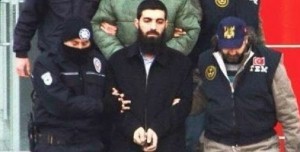Special to WorldTribune.com
ANKARA — Turkey has released a man identified as head of the nation’s Al Qaida network.
A Turkish court released leading Islamic insurgency suspects detained in operations against Al Qaida in January 2014. One of them was identified as Halis Bayancuk, also known as Abu Hanzala, deemed the head of Al Qaida’s network in Turkey.

Turkish sources said Bayancuk was ordered released by a court in the eastern city of Van. They said prosecutors were told not to indict the alleged Al Qaida chief.
The release of Bayancuk was said to reflect Turkey’s alliance with Islamic insurgents, including Al Qaida, Muslim Brotherhood and Islamic State of Iraq and Levant. A founder of the ruling Justice and Development Party, Dengir Firat, has asserted that President Recep Erdogan provided weapons and other supplies to ISIL.
On Jan. 14, 2014, Turkish special operations forces raided a series of suspected Al Qaida strongholds in six provinces.
At least 25 suspects were arrested and charged with membership in Al Qaida and bringing fighters from Afghanistan and Pakistan for the civil war in Syria. One of them was Bayancuk, said to have replaced Habip Akdas, responsible for Al Qaida’s attack in Istanbul in 2003 and later killed in a U.S. air strike in Iraq.
Within days of the operation, the Erdogan government retaliated. The sources said the judge who approved the raids was reassigned as were prosecutors and police officials.
Ten months later, only six of the 25 suspects have been indicted, with four of them still in detention, including a member of the Humanitarian Aid Foundation, linked to Erdogan. The others have been released.
Another target in the January 2014 raid was Ibrahim Sen, deemed a leading Al Qaida operative in the Middle East. In 2008, Sen was sent to Turkey by the United States and sentenced to more than six years on security offenses. The sentence has been repeatedly appealed and never confirmed by the Supreme Court.
The sources said Erdogan has been able to free leading suspected insurgents through the government’s virtual takeover of the judiciary.
Erdogan, who led Turkey since 2002, has replaced or reassigned hundreds of judges and gave magistrates, most of them loyalists, unprecedented authority.
In an interview with the Turkish daily Taraf on Oct. 11, Firat, one of the few associates to have turned against Erdogan, said the government formed an alliance with ISIL and Al Qaida to stop Kurdish nationalism. Firat said the government enabled weapons, funds and fighters to flow to Al Qaida militias in northern Syria.
“All these miscalculated policies have brought Turkey to the point we are facing now,” Firat said.

You must be logged in to post a comment Login